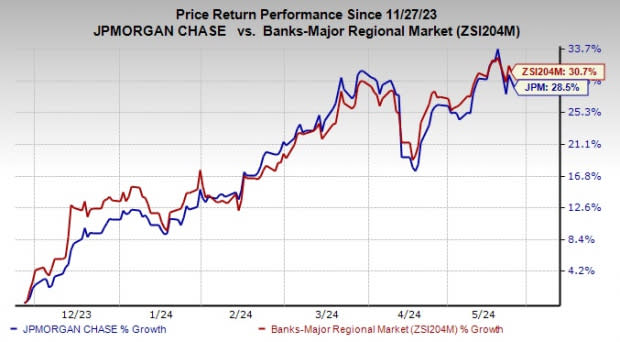JPMorgan (JPM) Gets CFTC Order to Pay for Surveillance Lapses
An order has been issued against JPMorgan JPM by the Commodity Futures Trading Commission (“CFTC”) to pay a $200-million civil monetary penalty for failing to capture billions of orders in its surveillance systems.
The order also requires the bank to cease and desist from further violations of the CFTC’s supervision requirements, and comply with conditions and undertakings specified in the order.
The order provides that the monetary penalty obligation will be offset by $100 million of any payment made pursuant to the resolution with JPMorgan, concerning surveillance gaps by the Office of the Comptroller of the Currency (“OCC”) dated Mar 14, 2024, and the Board of Governors of the Federal Reserve System dated Mar 8, 2024.
JPM has admitted to the facts in the order and has acknowledged that its conduct in certain sections violated the CFTC regulations.
Per the order, in 2021, while onboarding a new trading exchange, the Wall Street giant discovered that its surveillance of trading on multiple venues and trading systems was not operating correctly.
The surveillance gaps resulted from JPM’s failure to configure certain data feeds to ensure complete trade and order data were being ingested by the firm’s surveillance tools.
On a specific contract market, JPM failed to surveil billions of order messages from 2014 through 2021, which consisted of sponsored access trading activity for three significant algorithmic trading firms.
The order states that JPMorgan had a quarterly reconciliation process in place designed to ensure the completeness of some order and trade data ingested into certain surveillance systems. However, the bank did not subject direct-from-exchange data feeds to that reconciliation process, based on an incorrect assumption that data directly from an exchange was from a “golden source” and thus did not need to be tested.
Prior to this order, in March, JPM agreed to pay a fine of $348.2 million for a similar failure. That fine was imposed by the Federal Reserve and the OCC.
The regulators said that JPM “engaged in unsafe or unsound practices” and “failed to establish adequate governance over trading venues on which it is active.”
The OCC stated that JPMorgan “failed to surveil billions of instances of trading activity on at least 30 global trading venues.”
The $348.2-million amount was one of the biggest fines that JPM paid for its data management and monitoring lapses in the last few years.
In 2021, JPMorgan agreed to pay $200 million to settle civil charges from two other regulators over record-keeping lapses.
Over the past six months, JPM shares have gained 28.5% compared with the industry’s 30.7% growth.

Image Source: Zacks Investment Research
Currently, JPM carries a Zacks Rank #3 (Hold). You can see the complete list of today’s Zacks #1 Rank (Strong Buy) stocks here.
Fines Related to Record-Keeping Lapses Faced by Other Banks
In August 2023, Goldman Sachs GS was charged with a civil penalty of $5.5 million, per a CFTC order. The order required GS to cease and desist from committing future violations of the Commodity Exchange Act and CFTC’s record-keeping provisions.
Per the CFTC’s findings, GS violated the provisions of a previous order and failed to appropriately record and retain certain audio files.
In November 2019, Goldman was levied with a civil penalty of $1 million for the failure to record the phone lines of its trading and sales desk in January and February 2014 for 20 calendar days. The CFTC’s order required the company to cease and desist from further violations of record-keeping regulations.
Post the 2019 order, Goldman continued to have record-keeping failures, which were in violation of the cease-and-desist provisions. It failed to record and retain audio calls due to failure in both its hardware and software systems.
In another case, Citigroup Inc. C consented to the Securities and Exchange Commission’s (“SEC”) cease-and-desist order, levying a civil penalty of $2.9 million on the bank. The bank’s broker-dealer unit was charged for intentionally violating record-keeping requirements with respect to expenses incurred in its underwriting business.
C neither denied nor admitted the alleged claims of the SEC’s findings.
Per the SEC’s findings, Citigroup’s broker-dealer implemented an unverified method for the calculation of its indirect expenses from at least 2009 through May 2019 in its underwriting business.
It was found that in each deal, wherein Citigroup was engaged as a lead underwriter, it applied a fixed percentage to the underwriting fee to calculate the indirect expense amount. It then used fixed “allocation grids” to divide the indirect expense amount into certain specific expense categories.
Want the latest recommendations from Zacks Investment Research? Today, you can download 7 Best Stocks for the Next 30 Days. Click to get this free report
The Goldman Sachs Group, Inc. (GS) : Free Stock Analysis Report
JPMorgan Chase & Co. (JPM) : Free Stock Analysis Report
Citigroup Inc. (C) : Free Stock Analysis Report

 Yahoo Finance
Yahoo Finance 